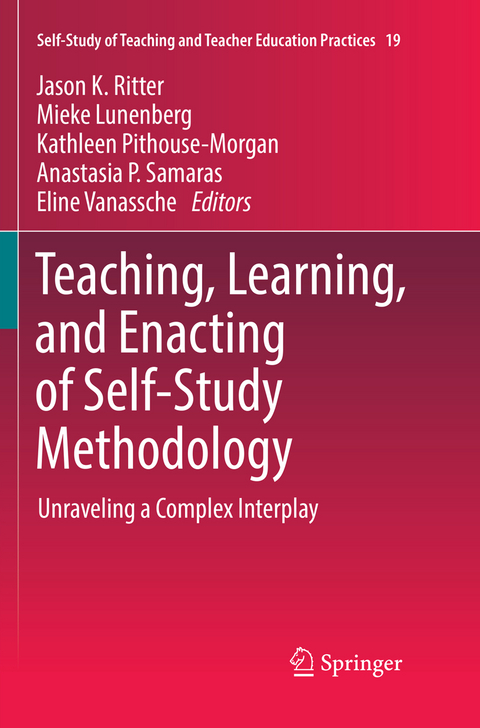
Teaching, Learning, and Enacting of Self-Study Methodology
Springer Verlag, Singapore
978-981-13-4066-6 (ISBN)
Jason K. Ritter is Associate Professor in the Department of Instruction and Leadership in Education at Duquesne University, Pittsburgh, Pennsylvania, USA, and the Content Area Director for graduate and undergraduate social studies education. His research focuses on better understanding and promoting the notion of teaching as a process of critical inquiry capable of fulfilling the democratic mission of schooling, which has led to related interests in the professional learning and development of teacher educators. Mieke Lunenberg is Associate Professor at VU University Amsterdam, the Netherlands. An expert on the professional development of teacher educators, she has had a leading role in several national projects for supporting the professional development of teacher educators. She has also worked with teacher educators in other countries and is a founding member of the International Forum for Teacher Educator Development (InFo-TED). She has written numerous publications on teacher educators. Kathleen Pithouse-Morgan is Associate Professor of Teacher Development Studies at the University of KwaZulu-Natal, South Africa. The trajectory of her academic work has led to an original conceptualisation of “polyvocal professional learning”, which makes visible how dialogic encounters with diverse ways of seeing and knowing can deepen and extend professional learning. This conceptualisation was developed in collaboration with Anastasia P. Samaras and is the focus of their recent edited book, Polyvocal Professional Learning through Self-Study Research (2015). Anastasia P. Samaras is Professor of Education at the College of Education and Human Development at George Mason University, Virginia, USA and Division Director of Elementary, Literacy, and Secondary Education Programs. Her research centres on neo-Vygotskian-based applications in transdisciplinary self-study of professional learning communities and include Polyvocal Professional Learning through Self-Study Research (2015) and Self-Study Teacher Research (2011) which she has taught to students, classroom teachers and faculty. Eline Vanassche is a Marie Skłodowska-Curie Fellow 2017-2019 at the University of East London. She is a former assistant professor at Maastricht University and postdoctoral researcher at the University of Leuven where she was awarded her PhD in Education. Her research interests include the nature of teacher educators' professionalism and its development throughout their careers, with a particular focus on the interplay between teacher educators and the social and structural contexts of their work.
Learning about self-study of teacher education practices.- Teaching, learning and enacting of self-study research methodology: A readers' guide.- Section 1 Teaching, Learning, and Enacting of Self-Study Methodology in the United States.- Self-study research as a source of professional development and learning within a school of education.- On the tension-fraught enterprise of teaching self-study to colleagues.- Identifying tensions and striving to improve international mathematics teacher educators' practice through self-study.- "Self-study" is not "Self": Researching lived experience in teacher educator development.- Self-study to help teachers engage in diversity.- Using S-step to understand faculty roles in establishing teachers of color.- My journey as a teacher educator.- Begin with yourself: Using self-study methodology in the process of cultivating mindfulness.- Being othered and finding my voice: Using self-study to better understand my experiences as an early childhood teachereducator.- Insight gleaned from our participation in a faculty self-study learning group.- Section 2 Teaching, Learning, and Enacting of Self-Study Methodology in the Netherlands.- Teaching and learning self-study research: Tracing the map.- Saying 'Yes' to the adventure: Navigating a collective journey of self-study research.- Stimulating students growth through written feedback: A self-study on supporting students' research projects.- Experiences of a school based teacher educator: A vignette.- The research inside me: The quest for meaningful research in a shifting academic landscape.- Signposts, profits and pitfalls in teaching and learning self-study research: A conversation.- Section 3 Teaching, Learning, and Enacting of Self-Study Methodology in Flanders (Belgium).- Retelling and reliving the story: Teacher educators researching their own practice in Flanders (Belgium).- The role of the teacher educator during supervisory conferences.- Teaching as a general educationist in physical education.- Internship assignments as a bridge between theory and practice?,.- Section 4 Interlude.- Towards a better understanding of teacher educators' professional development: Teacher educators' researcherly disposition as a promising concept.- Section 5 Teaching, Learning, and Enacting of Self-Study Methodology in Polyvocal Professional Communities.- Self-study research in a polyvocal professional community design.- "Standing a messy sandpit": The learning side of self-study research.- Dwelling in the question: Professional empowerment through complex visual self-study.- Learning through enacting Arts-informed self-study research with critical friends.- "Many stories matter": Taking a polyvocal stance in learning about teaching of self-study.
| Erscheinungsdatum | 21.01.2019 |
|---|---|
| Reihe/Serie | Self-Study of Teaching and Teacher Education Practices ; 19 |
| Zusatzinfo | 23 Illustrations, black and white; XII, 328 p. 23 illus. |
| Verlagsort | Singapore |
| Sprache | englisch |
| Maße | 155 x 235 mm |
| Themenwelt | Geisteswissenschaften ► Psychologie ► Pädagogische Psychologie |
| Sozialwissenschaften ► Pädagogik ► Berufspädagogik | |
| Sozialwissenschaften ► Pädagogik ► Bildungstheorie | |
| ISBN-10 | 981-13-4066-8 / 9811340668 |
| ISBN-13 | 978-981-13-4066-6 / 9789811340666 |
| Zustand | Neuware |
| Informationen gemäß Produktsicherheitsverordnung (GPSR) | |
| Haben Sie eine Frage zum Produkt? |
aus dem Bereich


